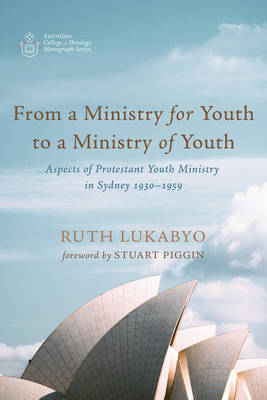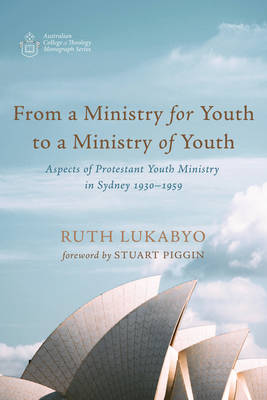
- Afhalen na 1 uur in een winkel met voorraad
- Gratis thuislevering in België vanaf € 30
- Ruim aanbod met 7 miljoen producten
- Afhalen na 1 uur in een winkel met voorraad
- Gratis thuislevering in België vanaf € 30
- Ruim aanbod met 7 miljoen producten
Zoeken
From a Ministry for Youth to a Ministry of Youth
Aspects of Protestant Youth Ministry in Sydney 1930-1959
Ruth Lukabyo
€ 74,95
+ 149 punten
Uitvoering
Omschrijving
At a time of unprecedented secularization and declining church attendance, youth ministry in the twenty-first century should be doomed. So why is Protestant youth ministry in Sydney vibrant, and in many places growing? This book sets out to answer this question, which is of such importance for the future of the Australian church. A pioneering model of youth ministry evolved in the 1930s and was already flourishing in churches, schools, and university by the 1950s. Its early high point was the Billy Graham Crusade of 1959, which may legitimately be seen as an Australian youth revival. The new model broke with past practice by cultivating ministry leadership by young people, by promoting peer groups to nurture and share faith, and by fostering ministry collaboration between young men and women. The model, used by theological conservatives and liberals alike, and has proved both enduring and fruitful. This book will engage with the model of youth ministry and the religious experiences of young people in Sydney. By reading it you will not only learn from the significant achievements of young people in the past but be better equipped to creatively consider new methods of ministry for the twenty-first century.
Specificaties
Betrokkenen
- Auteur(s):
- Uitgeverij:
Inhoud
- Aantal bladzijden:
- 260
- Taal:
- Engels
- Reeks:
Eigenschappen
- Productcode (EAN):
- 9781725282438
- Verschijningsdatum:
- 30/09/2020
- Uitvoering:
- Hardcover
- Formaat:
- Genaaid
- Afmetingen:
- 152 mm x 229 mm
- Gewicht:
- 517 g

Alleen bij Standaard Boekhandel
+ 149 punten op je klantenkaart van Standaard Boekhandel
Beoordelingen
We publiceren alleen reviews die voldoen aan de voorwaarden voor reviews. Bekijk onze voorwaarden voor reviews.











